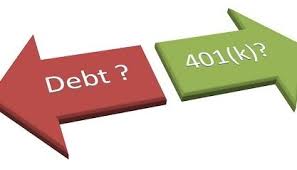 What should you do – pay off debt or invest in retirement?
What should you do – pay off debt or invest in retirement?
From a long-term financial perspective, it is important to invest for your retirement and build nest-egg. But how can you do it when you have stacks of bills to pay off? Should you use your money to pay off debts? Or, should you save money to build your nest-egg?
A few tricky questions indeed.
The answers to these questions depend on various factors. Let’s try to find out those answers in this post.
Factors to consider
Factors determining if you should pay off debt or invest in retirement are given below:
- Your age
- Your income
- Your expenses
- Your total debt amount
- How much you can pay towards your debt
- How much you can afford to invest in retirement
- No major life events in the pipeline
- How soon you can repay your bills
When should you invest money for your retirement?
There are a few scenarios where it makes sense to invest in retirement instead of paying off debts. Let’s discuss them one by one.
- You are many years away from retirement
When you are young, you can enjoy greater benefits from investments than old people. If you invest $10,000 in a 401 (k) plan with an annual interest rate of 8 percent, then after 40 years, you can expect to get $217,000 owing to the power of compounding interests.
If you spend $10,000 for paying off a loan with a 4 percent interest rate, then you would probably save a lot less than what you would earn from retirement investment plans.
- Your debt amount is small and manageable
When your debt amount is negligible or of a small amount, you can pay it off without any problem. You can just make minimum monthly payments and focus on your investments.
- You have mostly secured loans like mortgages
You have mostly secured debts like home loans. The tenure of home loans is pretty long. So, you get a lot of time to pay them off. Home loan interest rates are low. They don’t create additional financial pressure on you. Moreover, some home loans have prepayment penalties. Therefore, it makes sense to invest in retirement savings funds and get a better return on your money.
When should you pay off your debts first?
There is no doubt that building your nest-egg is important for leading a comfortable life after retirement. But there are certain times when you have to try to pay off debt first and then invest in retirement. Here are a few of them.
- You want to buy a home but have a poor credit score
You are planning to buy a home soon. But you have lots of unpaid debts. There are too many negative listings on your credit report. As such, your credit score is too low.
Two things can happen when you have a low credit score. First, you may not qualify for a home loan. Secondly, you may not be eligible for the desired interest rate.
If you want to qualify for a mortgage at a low-interest rate, then you have to pay off debts without hurting your credit. You can enroll in a debt consolidation program to repay your debts and gradually boost your credit score. In a debt consolidation program, you can pay the full amount and that too at a low-interest rate. Since you are paying the full amount, your credit score improves with time.
You can invest in retirement later.
- Creditors are threatening to file a lawsuit against you
Creditors can file a lawsuit against you in the event of a loan default. Some creditors are quite aggressive, and they file lawsuits against consumers when they miss payments for several months. If your creditors are threatening to sue you for valid debts, then you should arrange money anyhow and pay them off. Legal hassles are emotionally exhausting, time-consuming, and expensive. So, in this situation, you should stop thinking about building your nest-egg for the time being and use all your financial resources to pay off your debts.
- You have a bunch of high-interest debts
High-interest debts like credit cards and payday loans eat up a lot of your money. The interest rates on payday loans are enormous. The average interest rate on payday loans is around 400 percent. If you don’t pay off a payday loan soon, then imagine how much you have to pay on the interest. Likewise, if you have accumulated a substantial amount on credit cards, then also you should pay it off before saving for retirement. If you just make the minimum payments, then the compounding interest will increase your debt amount with each passing month. You may end up paying double or triple the amount you borrowed on your credit cards.
Final words
Ultimately, it comes down to comparing interest rates. Calculate how much interest you will earn from your retirement savings plans. Next, calculate how much interest you have to pay for your debts. If the annualized average return from investments is more than what you are paying on your debts, then you should opt for the first one. For instance, if you are earning a 7 percent interest rate from mutual funds and you are paying 5 percent interest on credit cards, then you should certainly go for the investment.
A good strategy will be to pay off your high-interest debts and use surplus funds to invest in retirement. If you are still confused, then consult a financial advisor and act as per his guidance.
About The Author
Aiden White is a financial writer who lives in Dudley, Massachusetts. She started her financial journey in 2015 and has been associated with consolidatecreditcard.org for the last 2 years. Through her writing, she has inspired people to overcome their credit card debt problems and solve their personal finance based queries. Being a debt fighter in her personal life, her goal is to share innovative thoughts and knowledge in the debt communities. Learn more by visiting Twitter- https://twitter.com/aidenwhitejoe



No Comments